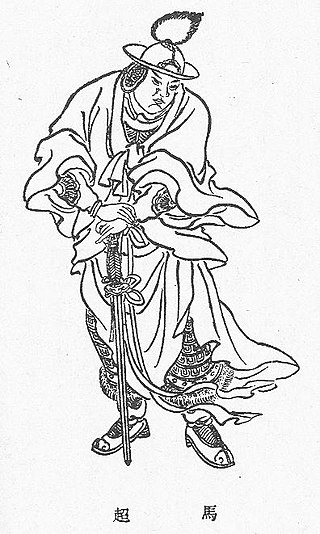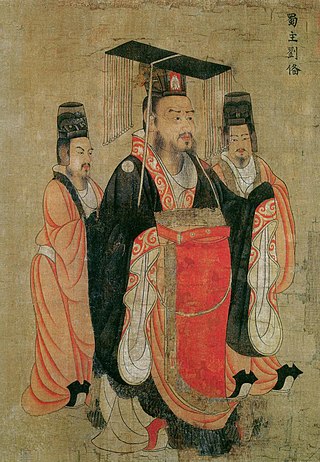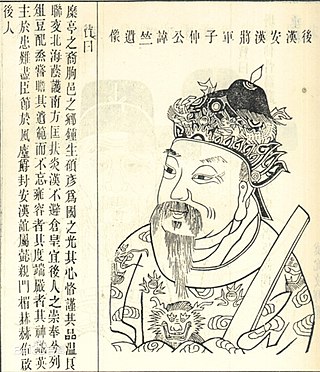Related Research Articles

Ma Chao (176–222), courtesy name Mengqi, was a Chinese military general and warlord who lived in the late Eastern Han dynasty and early Three Kingdoms period of China. A descendant of the general Ma Yuan, Ma Chao was the eldest son of Ma Teng, a prominent warlord in Liang Province. In 211, he formed a coalition with Han Sui and other northwestern warlords and revolted against the Han central government, which was led by the warlord Cao Cao. The coalition broke up after losing the Battle of Tong Pass against Cao Cao's forces. Ma Chao initially retreated, but later returned to attack and seize control of Liang Province by killing the provincial inspector Wei Kang and forcing Wei Kang's subordinates to submit to him. About a year after Ma Chao started his uprising, Emperor Xian issued an imperial decree ordering the execution of Ma Chao's family members, who were in Ye city at the time. In the meantime, Wei Kang's subordinates, led by Zhao Ang, Yang Fu and others, rebelled against Ma Chao and forced him out of Liang Province. Ma Chao retreated to Hanzhong Commandery, where he borrowed troops from the warlord Zhang Lu, and returned to attack Liang Province but was ultimately defeated and driven back. Ma Chao took shelter under Zhang Lu for a while until around 214, when he heard that the warlord Liu Bei was fighting for control over Yi Province with Yi Province's governor, Liu Zhang. He defected to Liu Bei's side and assisted Liu Bei in capturing Yi Province from Liu Zhang. Ma Chao had served as a general under Liu Bei since then and participated in the Hanzhong Campaign in 219. He died in 222.

The Yellow Turban Rebellion, alternatively translated as the Yellow Scarves Rebellion, was a peasant revolt during the late Eastern Han dynasty of ancient China. The uprising broke out in c. March 184 CE, during the reign of Emperor Ling. Although the main rebellion was suppressed by 185 CE, it took 21 years for full suppression of resistant areas and emerging rebellions by 205 CE. The weakening of the imperial court and the rising political influence of ultra-autonomous regional military-governors, who helped suppress the rebellion, eventually led to rampant warlord dominance and the resultant Three Kingdoms period.

Zhang Liao, courtesy name Wenyuan, was a Chinese military general serving under the warlord Cao Cao in the late Eastern Han dynasty of China. He served briefly in the state of Cao Wei, founded by Cao Cao's successor Cao Pi, in the early Three Kingdoms period before his death. Formerly a subordinate of other warlords such as Ding Yuan, Dong Zhuo and Lü Bu, Zhang Liao joined Cao Cao around 198 after Lü Bu's downfall at the Battle of Xiapi. Since then, he participated in many of Cao Cao's military campaigns, including those against Yuan Shao's heirs and the Wuhuan tribes from 201 to 207. He is best known for his pivotal role in the Battle of Xiaoyao Ford in 214–215, in which he successfully defended Hefei from the forces of the warlord Sun Quan.

The Battle of Xiaoting (猇亭之戰), also known as the Battle of Yiling and the Battle of Yiling and Xiaoting, was fought between the state of Shu and the state of Wu, between the years 221 and 222 in the early Three Kingdoms period of China. The battle is significant because Wu was able to turn the situation from a series of initial losses into a defensive stalemate, before proceeding to win a decisive victory over Shu. The Wu victory halted the Shu invasion and preceded the death of Liu Bei, Shu's founding emperor.

Liu Bei, courtesy name Xuande (玄德), was a Chinese warlord in the late Eastern Han dynasty who later became the founding emperor of Shu Han, one of the Three Kingdoms of China. Although he was a distant relative of the Han imperial family, Liu Bei's father died when he was a child and left his family impoverished. To help his mother, he sold shoes and straw mats. When he reached the age of fifteen, his mother sent him to study under Lu Zhi. In his youth, Liu Bei was known as ambitious and charismatic. He gathered a militia army to fight the Yellow Turbans. Liu Bei fought bravely in many battles and grew famous for his exploits. Later, he participated in the coalition against Dong Zhuo, following this joined his childhood friend Gongsun Zan and fought under him against Yuan Shao.

Zhang He, courtesy name Junyi, was a military general serving under the warlord Cao Cao in the late Eastern Han dynasty of China. He continued serving in the state of Cao Wei under its first two rulers, Cao Pi and Cao Rui, during the Three Kingdoms period until his death.

Lü Bu, courtesy name Fengxian, was a Chinese military general, politician, and warlord who lived during the late Eastern Han dynasty of Imperial China. Originally a subordinate of a minor warlord Ding Yuan, he betrayed and murdered Ding Yuan and defected to Dong Zhuo, the warlord who controlled the Han central government in the early 190s. In 192, he turned against Dong Zhuo and killed him after being instigated by Wang Yun and Shisun Rui, but was later defeated and driven away by Dong Zhuo's followers.

Zhang Fei, courtesy name Yide, was a Chinese military general and politician serving under the warlord Liu Bei in the late Eastern Han dynasty and early Three Kingdoms period of China. Zhang Fei and Guan Yu, who were among the earliest to join Liu Bei, shared a brotherly relationship with their lord and accompanied him on most of his early exploits. Zhang Fei fought in various battles on Liu Bei's side, including the Red Cliffs campaign (208–209), takeover of Yi Province (212–214), and Hanzhong Campaign (217–218). He was assassinated by his subordinates in 221 after serving for only a few months in the state of Shu Han, which was founded by Liu Bei earlier that year.
Hou Cheng was a military officer serving under the warlord Lü Bu during the late Eastern Han dynasty of China.

Mi Zhu, courtesy name Zizhong, was a Chinese military general and politician who served under the warlord Liu Bei in the late Eastern Han dynasty, during the Three Kingdoms period, after Liu Bei founded the state of Shu Han. He was also Liu Bei's brother-in-law, as his sister, Lady Mi, married Liu Bei. Mi Zhu was essential to Liu Bei during the defeats of the latter, financing Liu Bei's army in critical times where there was no tax base. Mi Zhu was extremely well educated and helped Liu Bei develop relationships with wealthy rivals such as Yuan Shao, Yuan Shu and Liu Biao. He was also the elder brother of Mi Fang, who served Liu Bei as well until his defection to Liu Bei's ally-turned-rival Sun Quan in 220. Mi Zhu served Liu Bei loyally for more than 25 years, as a high civil official of Liu during all the later's tenures as governor of Xu, Jing and Yi provinces, the former's ideas were regularly and widely circulated to the common people which greatly helped Liu Bei's political movement as Han loyalist and Confucian but, historians would argue it mere rhetoric as Liu ruled more in the tradition of legalism. Nonetheless, Mi along with Jian Yong, Sun Qian, and later Yi Ji, greatly contributed to the Liu's populist movement to restore the Han dynasty through literature and essays. Mi Zhu was thought to be Liu's best friend and most favored subject, he died of illness a little over a year after Liu Bei declared himself emperor.

Cao Hong, courtesy name Zilian, was a Chinese military general of the state of Cao Wei during the Three Kingdoms period of China. He started his career in the late Eastern Han dynasty under the warlord Cao Cao, who was his older second cousin.
Chen Deng, courtesy name Yuanlong, was a Chinese military general and politician who lived in the late Eastern Han dynasty of China. Born in a family of government officials in Xu Province, he started his career as a county chief at the age of 24 and later became an agriculture official under Tao Qian, the Governor of Xu Province. After Tao Qian's death in 194, Chen Deng supported Liu Bei to be the new Governor. However, in 196, he was forced to become a subordinate of the warlord Lü Bu after the latter seized control of Xu Province from Liu Bei. During this time, Chen Deng and his father Chen Gui pretended to be loyal towards Lü Bu, while secretly undermining his influence by dissuading him from allying with another warlord Yuan Shu. Chen Deng also secretly agreed to serve as a mole in Xu Province for the warlord Cao Cao, who controlled the Han central government. Chen Deng was then appointed as the Administrator of Guangling Commandery. During the Battle of Xiapi of 198–199, Chen Deng led his troops to join Cao Cao and assisted him in defeating Lü Bu. After the victory, Chen Deng was given an additional appointment as General Who Calms the Waves. During his tenure in Guangling Commandery, he gained high popularity among the people for good and benevolent governance – to the point where the people even wanted to follow him after learning that he had been reassigned to another commandery. He also resisted two invasions by the forces of Sun Ce, a warlord who controlled territories in the Jiangnan region. He died in an unknown year at the age of 38 due to an illness caused by intestinal parasites.
Cao Bao was a military officer serving under Tao Qian, the Governor of Xu Province, during the late Eastern Han dynasty of China. He became a subordinate of Tao Qian's successor, Liu Bei, after Tao's death in 194. He was killed by Zhang Fei in 196 after a quarrel.
Chen Gui, courtesy name Hanyu, was a Chinese politician who lived in the late Eastern Han dynasty of China.
Zhang Miao, courtesy name Mengzhuo, was a Chinese politician and warlord who lived in the late Eastern Han dynasty of China.
Bu Zhi, courtesy name Zishan, was a Chinese military general and politician of the state of Eastern Wu during the Three Kingdoms period of China. Originally a scholar of humble background, he became a subordinate of the warlord Sun Quan in the late Eastern Han dynasty and gradually rose through the ranks. Between 210 and 220, he served as the governor of the remote and restive Jiao Province in southern China. During the Battle of Xiaoting/Yiling of 221–222, he quelled local uprisings in Sun Quan's territories in southern Jing Province and maintained peace in the area. After Sun Quan became emperor in 229, Bu Zhi oversaw the Wu armed forces guarding the Wu–Shu border at Xiling for about 20 years. During this time, he also gave advice to Sun Quan's first heir apparent, Sun Deng, and spoke up for officials affected by Lü Yi's abuses of power. In 246, he became the fourth Imperial Chancellor of Wu, but died in office in the following year.
The Battle of Xiapi was fought between the forces of Lü Bu against the allied armies of Cao Cao and Liu Bei from the winter of 198 to 7 February 199 towards the end of the Eastern Han dynasty in China. The battle concluded with victory for Cao Cao and Liu Bei, with Lü Bu being subsequently executed.
Liu Bei's takeover of Yi Province was a military campaign by the warlord Liu Bei in taking control of Yi Province from the provincial governor, Liu Zhang. The campaign took place between the years 211 and 214 in the late Eastern Han dynasty; although the conflict between Liu Bei and Liu Zhang started in January or February 213 when the latter discovered the former secret communications and subsequently executed Zhang Song. It concluded with victory for Liu Bei and his successful takeover of the province from Liu Zhang in July 214. Yi Province would serve as the foundation of the state of Shu Han during the Three Kingdoms period.
The following is the order of battle for the Battle of Red Cliffs.
References
- ↑ ([孝獻皇帝建安元年] ... 術遣將紀靈等步騎三萬攻劉備,備求救於布。 ...) Zizhi Tongjian vol. 62.
- ↑ (術遣將紀靈等步騎三萬攻劉備,備求救於布。諸將謂布曰:「將軍常欲殺劉備,今可假手於術。」布曰:「不然。術若破備,則北連泰山諸將,吾為在術圍中,不得不救也。」便率步騎千餘馳往赴之。靈等聞布至,皆斂兵而止。) Zizhi Tongjian vol. 62.
- ↑ (術便嚴步兵千、騎二百,馳往赴備。) Sanguozhi vol. 7.
- ↑ (術遣將紀靈等步騎三萬以攻備,備求救於布。諸將謂布曰:「將軍常欲殺劉備,今可假手於術。」布曰:「不然。術若破備,則北連太山,吾為在術圍中,不得不救也。」便率步騎千餘,馳往赴之。靈等聞布至,皆斂兵而止。) Houhanshu vol. 75.
- ↑ (布屯沛城西南,遣鈴下請靈等,靈等亦請布,布往就之,與備共飲食。) Zizhi Tongjian vol. 62.
- ↑ (布於沛西南一里安屯,遣鈴下請靈等,靈等亦請布共飲食。布謂靈等曰:「玄德,布弟也。弟為諸君所困,故來救之。布性不喜合鬬,但喜解鬬耳。」布令門候於營門中舉一隻戟,布言:「諸君觀布射戟小支,一發中者諸君當解去,不中可留決鬬。」布舉弓射戟,正中小支。諸將皆驚,言「將軍天威也」!明日復歡會,然後各罷。) Sanguozhi vol. 7.
- ↑ (布屯沛城外,遣人招備,并請靈等與共饗飲。布謂靈曰:「玄德,布弟也,為諸君所困,故來救之。布性不喜合鬬,但喜解鬬耳。」乃令軍候植戟於營門,布彎弓顧曰:「諸君觀布射小戟支,中者當各解兵,不中可留決鬬。」布即一發,正中戟支。靈等皆驚,言「將軍天威也」。明日復歡會,然後各罷。) Houhanshu vol. 75.
- ↑ Sanguo Yanyi ch. 14, 16, 21.
- Chen, Shou (3rd century). Records of the Three Kingdoms (Sanguozhi).
- Fan, Ye (5th century). Book of the Later Han (Houhanshu).
- Luo, Guanzhong (14th century). Romance of the Three Kingdoms (Sanguo Yanyi).
- Sima, Guang (1084). Zizhi Tongjian .